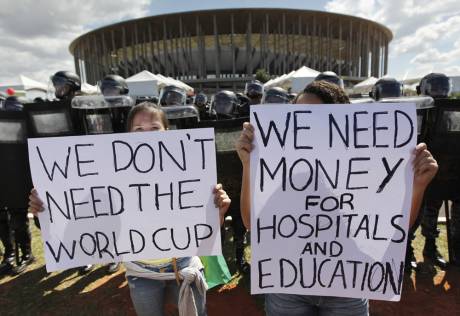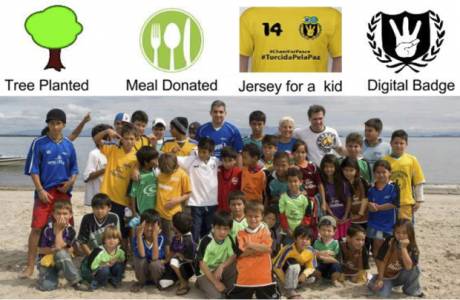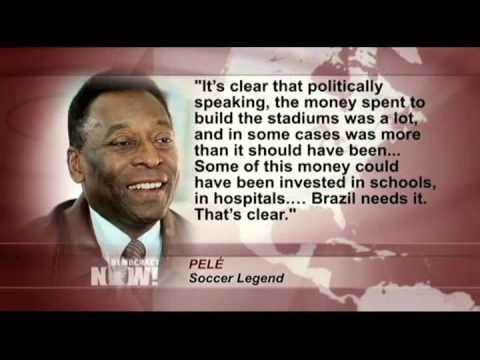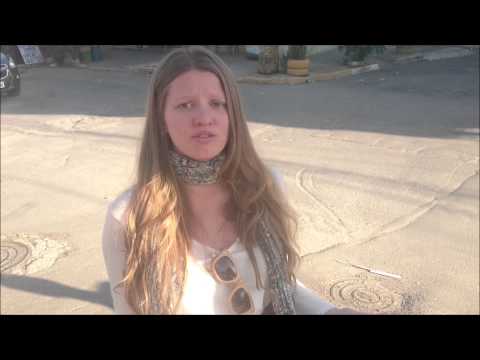|
Blog Feeds
Public InquiryInterested in maladministration. Estd. 2005
Human Rights in IrelandIndymedia Ireland is a volunteer-run non-commercial open publishing website for local and international news, opinion & analysis, press releases and events. Its main objective is to enable the public to participate in reporting and analysis of the news and other important events and aspects of our daily lives and thereby give a voice to people.
Lockdown Skeptics
Voltaire NetworkVoltaire, international edition
|
For a greener and socially fair World Cup – #CheerForPeace working with ALL of Brazil international |
environment |
news report international |
environment |
news report
 Thursday June 12, 2014 17:30 Thursday June 12, 2014 17:30 by Dunk - #CheerForPeace - charity group, Curitiba, Brazil by Dunk - #CheerForPeace - charity group, Curitiba, Brazil anirishecodudeinbrazil at gmail dot com anirishecodudeinbrazil at gmail dot com Curitiba, Brazil Curitiba, Brazil
 An Irishman's involvement with small movements for positive change in Brazil (An article on the protest in Brazil against the World Cup, aswell as a small campaign in the southern most host city, Curitiba, about the #CheerForPeace project which is working with communities in the cities most central favela Vila Torres) Changing Times In a recent online poll in Brazil, only 22 percent of people in the country are even going to root for Brazil during the World Cup. I mean, the amount of dissatisfaction with what FIFA has done in conjunction with the Workers’ Party is reaching historic heights. And, Amy, you and I have discussed these issues around mega-events for years—the displacement, the debt, the militarization of public space—and yet this is the first time, really since 1968 Olympics in Mexico City, that you have seen mass demonstrations in advance of the event itself. And that’s what makes this historic, and that’s why the whole world is watching Brazil right now. Possibly the greatest footballer of all time, Pelé, is even quoted as saying: “It’s clear that politically speaking, the money spent to build the stadiums was a lot, and in some cases was more than it should have been. … Some of this money could have been invested in schools, in hospitals. … Brazil needs it. That’s clear.” The cup is coming, little steps for positive change People will complain and protest and hopefully through these actions, positive change will come to Brazil. Some groups have called for a full boycott of the event, while some will march and perhaps riot behind the #NãoVaiTerCopa (There will not be a cup) banner which could lead to very ugly scenes and responses from the Brazilian police. But some groups recognize that the cup is going to happen and with that, are trying to use the event as a tool to make real positive change, all be it on a small scale. I am supporting and participating with a great initiative from one such group in my hometown: #Cheerforpeace, its symbol is the redefined three fingered peace sign you can see below. While there is much to be against, we are putting our energy and creativity into being FOR things; an idea of a peaceful state or way of being, based on 3 interconnected fundamental core principles: Social – Environmental – Economic The campaign has been developed by Brazilian students and it has an open co-creative philosophy, thereby trying to evolve as different people get involved with the project. It attempts to create a dialogue about the real impact of the world cup and to try to make steps toward the whole World Cup process being more ecologically and socially just. A fundraising campaign has been set up and the money will be used to assist in 3 areas, each relating to one of the core principles: Trees planted by SOS Mata Atlantica, an NGO that plants them in the devastated Atlantic Rainforest, they are monitored for 5 years and certified for optimal survival rates. Meals donated to Brazilian communities in need Jerseys & football kits provided for underprivileged Brazilian youth Although this campaign does not have the solutions to all the big problems facing Brazil, what it is doing, is promoting a vision of sustainable and socially just change and using this moment to demonstrate that vision through action, while the world looks on over the next few weeks. All of us involved come from a wide span of backgrounds, but we find common ground in this project and all agree that the holistic approach is the only choice we have. The 3 pillars of the campaign do not stand alone. Each one supports and reinforces the other two, all are mutually interdependent. The true richness and power of things resulting from the interaction and overlapping of each. In finishing off this article I will briefly explore each of the pillars in more detail: The Environmental The overall environmental cost of this world cup, in terms of Co2 emissions generated, will make it the highest for any sporting event, EVER! With an estimated 3.1 million Brazilian and 600,000 foreign travelers coming to watch the games and having to travel great distances between games by airplane, it will be TWICE that of the last world cup, the 2010 South African Cup. That Cup was one of the biggest environmental impacts of any sporting event in history, generating 2.75m tonnes of carbon emissions. That event had a carbon footprint eight times that of the 2006 World Cup in Germany. Our response is that part of the money raised will go to planting trees in the devastated Atlantic Rainforest, all along the coast of Brazil. These plantations will go to somewhat offset the massive levels of CO2 emissions generated by the cup. The trees will be planted by SOS Mata Atlantica, an NGO going since 1985, the plants will be monitored for 5 years and certified for optimal survival rates. The #CheerForPeace Brazil Jerseys that will be given to the underprivileged Youth in Brazil are made from 100% recycled plastic bottles. The campaign is being supported by and supporting back the e-book JABUJICABA, financial contributors have various options they wish to donate to #CheerForPeace, one option includes receiving a copy of the e-book: Which is about immersing yourself in the novel, falling in love with the rainforest, and engaging in action to help save it. A portion of the proceeds from the e-book go to the World Land Trust towards forest conservation. We are also setting up a big event on Sunday 15th of June, rather than having the normal type of food and drink party of hotdogs and Soft drinks, we will be offering more healthy options using organic fruit and veg sourced locally from suppliers in the city. The Economic Obviously the base of the quality of life in Brazil, a country of massive extremes, is one of economic well being. There is huge wealth here, huge resources and lots of money going around. But, like this world cup, it does not “trickle down” to all in society. So having views on that is one thing, but moving from views to action is the next step. Testing those views and trying to create moments, spaces and processes for change, this is the challenge to which #CheerForPeace has thrown itself into. The fundraising drive was set up, 10,000 US dollars was the hoped for goal. We have asked people coming here to “give a little back” to those that wont benefit in any way from the millions who visit. We are also asking people outside to assist, basic charity. Its quite normal for people in the richer “North” or “First World” to assist the poorer “South” or “Developing World”, but is it as normal for the richer ones in the “South” to help their own brothers and sisters? Turns out, not so much. We hope this campaign challenges such norms in the hope that Brazilians do do a little more to help themselves. Obviously simply giving money wont solve all the problems, unfortunately for many in richer countries it is felt that all problems can be solved by simply “throwing a little cash back”. The fundraising campaign kicks off a dialogue, it forces people to stop for a moment to consider the argument and maybe give something. If everyone just gave a fiver, there would be a lot of trees being planted and food being eaten, that might not happen otherwise. The second chunk of money donated to the campaign goes to donating meals to Brazilian communities in need. This is not restricted to Curitiba but passed onto groups around Brazil through the networks that the campaign supports and works with. We always try to demonstrate best practice, to highlight sustainable practices and groups in the city. So rather than simply go for a cheaper option; lowest quality food from giant supermarket chain, we have approached Curitiba’s wonderful Municipal Market. Some of their Organics sector kindly donated food for next Sundays event. Again the mutual support, the mixing of the pillars. This also tries to promote stronger local economies and might lead to better opportunities for employment for people in the future as well as a more resilient city. The Social The basic strength of the world cup is that it is something which brings the world together, for a brief moment, we are one. Those that travel, shout, roar, sing and cry along with their teams. The footballers who go out and play. The ones at home also shouting, roaring and crying. Even those whose team didn’t make it, but tune in avidly and share in the highs and lows just the same. At the end of the day we are social animals and being together is what we do. #CheerForPeace recognizes this and works with it to the maximum: It is allowing different people to come together and to try to make a difference. It is bringing together different groups of people and bringing those people to different places. For some, that even means going far beyond the limits of their normal comfort zone. This applies to both foreigners and Brazilians alike, as for many it will be the first time in their lives entering the zones where their poorer neighbors live, the shanty town, the favela. Some urbanists claim that as world trends continue, soon 1 in 4 people living on the planet will be living in such a settlement and that they are not “falling into poverty”, as is often the claim, but actually getting out of poverty by the fastest means possible. While many in the “West” or “North”, or even Brazil for that matter, view the favela in a totally negative light; a place of drugs, gangs, murder, crime, violence etc… Incredible things are also happening here, some of the most interesting and exciting ideas are coming from such worlds, especially in terms of design, recycling, micro business, women’s rights, grassroots political activism.. There is much for the world to learn yet. (For more on that I’d direct you to the research of Stewart Brand and Robert Neuwirth) Personally, I feel the idea of connection to be the key to all things; all problems, all solutions. Once we are thrown together, we adapt and learn. Normally it is the basic fear of “the other” that puts up the walls of distrust, jealousy, even hate, which lead to many of society’s rotten ills like racism and sectarianism. For me, as a newly arrived English speaking Irish immigrant to Curitiba, just another “Gringo” to the Brazilians, #CheerForPeace has allowed me to connect to something, to make friends, to share ideas and dreams, to learn a lot quickly, to end up in places I might not have ever ended up… and for all of that I am thankful. Hopefully my input will help. The history of the project came from a Brazilian women, a Curitibana, who moved to Canada. Seeing the power of football, the global game, but being aware of the major differences between the two countries, she decided to make a difference. She collected up old football jerseys in Canada and packed them into her suitcase when she came home, she started to distribute these to the poorest communities in Curitiba and the state of Parana. Then she started organizing trips with the students of Fanshawe College, where she worked in Canada, back to her hometown in Brazil. So Canadian youngsters came to Brazil and saw a very different reality from what they left behind. They donated the jerseys, played football games with their new Brazilian friends and generally got to find out about each other and each others worlds. A few years later, this exchange had grown into the NGO Football for Kids Foundation. Some time back more Canadian students did some charity work and got very nice red football jerseys sponsored for kids in the largest Favela in Brazil, Rocinha. They traveled there and learned about the reality and challenges of life there. Later in Curitiba there was another great team of architecture students who came to a place in the city that doubles up as a kids zone and food distribution point for a favela, there they designed and built a colorful lively play zone for the kids in what had been previously a drab space, they also gave out a few tops. You can see the look of joy on the face of one of the young kids below. From these great initiatives and through connections to Brazilian students here in Curitiba #CheerForPeace was born and in a few days time, next Sunday, will be our first major event. The day before the first World Cup game in the city we will go to the cities most central favela Vila Torres for a peoples world cup, its an open event, all are welcome and there will be football games, free food, art, games… a day of celebration for the community that can see the stadium but have no other means to feel part of the world cup party. So, these little events in themselves are not going to change the world. But, what they are doing, is creating small steps toward more individuals, more people, more communities breaking down the barriers that separate them. Each learning from the other, confronting the wrongs, injustices and reasons of poverty, building mutual understanding, finding shared dreams and visions, exchanging skills, different views and wisdom, understanding ideas of global solidarity… These little events wont change the world, but they are laying the foundations for movements that will. **** Duncan Crowley, June 11 2014, Curitiba, Brazil 5 page PDF version of this article found here: http://anirishecodudeinbrazil.files.wordpress.com/2014/...1.pdf Article also at An irish eco dude in brazil : http://anirishecodudeinbrazil.wordpress.com/2014/06/11/...eace/ Indian football network, 2 parts: 1 - Brazil’s Protest Against World Cup – Why the Anger? http://www.indianfootballnetwork.com/blog/2014/06/12/br...nger/ 2 - Brazil’s Protest Against World Cup – Striving for Positive Changes http://www.indianfootballnetwork.com/blog/2014/06/12/br...nges/
Caption: Video Id: WMPgRu9FIFA Type: Youtube Video Caption: Video Id: oZkLyTcBjPw Type: Youtube Video Caption: Video Id: WMPgRu9FIFA Type: Youtube Video Caption: Video Id: oZkLyTcBjPw Type: Youtube Video |



























 printable version
printable version

 Digg this
Digg this del.icio.us
del.icio.us Furl
Furl Reddit
Reddit Technorati
Technorati Facebook
Facebook Gab
Gab Twitter
Twitter